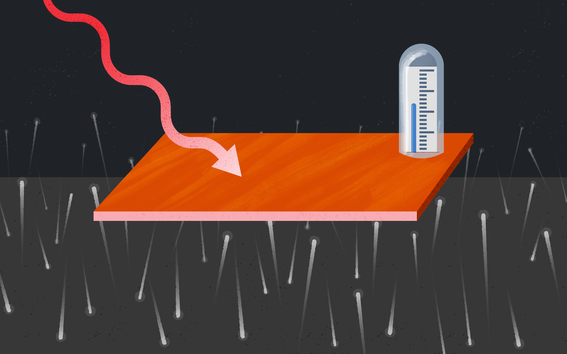How sensitive can your quantum detector be?

Quantum physics is moving out of the laboratory and into our everyday lives. Despite the big headline results about quantum computers solving problems impossible for classical computers, technical challenges are standing in the way of getting quantum physics into the real world. New research published in Nature Communications from teams at Aalto University and Lund University hopes to provide an important tool in this quest.
One of the open questions in quantum research is how heat and thermodynamics coexist with quantum physics. This research field, “quantum thermodynamics”, is one of the areas Professor Jukka Pekola, the leader of the QTF Centre of Excellence of the Academy of Finland, has worked on in his career. ‘This field has up to now been dominated by theory, and only now important experiments are starting to emerge’ says Professor Pekola. His research group has set about creating quantum thermodynamic nano-devices that can solve open questions experimentally.
Quantum states – like the qubits that power quantum computers – interact with their surrounding world, and these interactions are what quantum thermodynamics deals with. Measuring these systems requires detecting energy changes so exceptionally small they are hard to pick out from background fluctuations, like using only a thermometer to try and work out if someone has blown out a candle in the room you're in. Another problem is that quantum states can change when you measure them, simply because you’ve measured them. This would be like putting a thermometer in a cup of cold water making the water start to boil. The team had to make a thermometer able to measure very small changes without interfering with any of the quantum states they plan to measure.
Doctoral student Bayan Karimi works in QTF and Marie Curie training network QuESTech. Her device is a calorimeter, which measures the heat in a system. It uses a strip of copper about one thousand times thinner than a human hair. ‘Our detector absorbs radiation from the quantum states. It is expected to determine how much energy they have and how they interact with their surroundings. There is a theoretical limit to how accurate a calorimeter can be, and our device is now reaching that limit’, says Karimi.
The experimental part of the work has been performed at OtaNano national research infrastructure for micro, nano and quantum technologies in Finland. Besides Pekola and Karimi, the team consists of Dr Fredrik Brange and professor Peter Samuelsson from Lund University. The research is published in Nature Communications on 17 January and you can access the full paper here https://dx.doi.org/10.1038/s41467-019-14247-2
Learn More
People
Funding
This work was funded through Academy of Finland, the European Union’s Horizon 2020 research and innovation program under the European Research Council program and Marie Sklodowska-Curie actions.
Read more news
A survey on users' experiences of Mykanta in collaboration between Aalto University and Kela
Senior university lecturer Sari Kujala's research group is exploring, in collaboration with Kela, users' experiences with the Mykanta online patient portal and the MyKanta mobile application.
Measuring urban nature: new habitat types and criteria support the prevention of biodiversity loss
A recent report introduces an anthropogenic habitat classification and assessment criteria that make it possible to visualize, measure, and compare nature in the built environment. These tools enable the assessment of ecological condition and support the development of green infrastructure and the prevention of biodiversity loss in cities.
What drives success in the film and audiovisual industries? New research to support growth and competitiveness
Aalto University Department of Film is leading a €1.6 million Co-Innovation research project, SmartSuccessAV, funded by Business Finland. The project aims to gain new research-based knowledge on how success in the Film and AV industry is managed and how decision-making is structured as production, financing, and distribution structures change.






